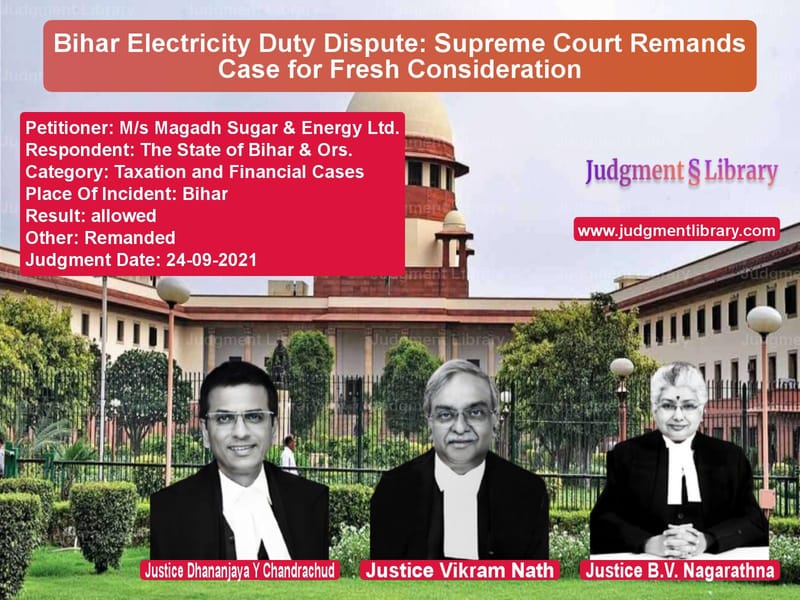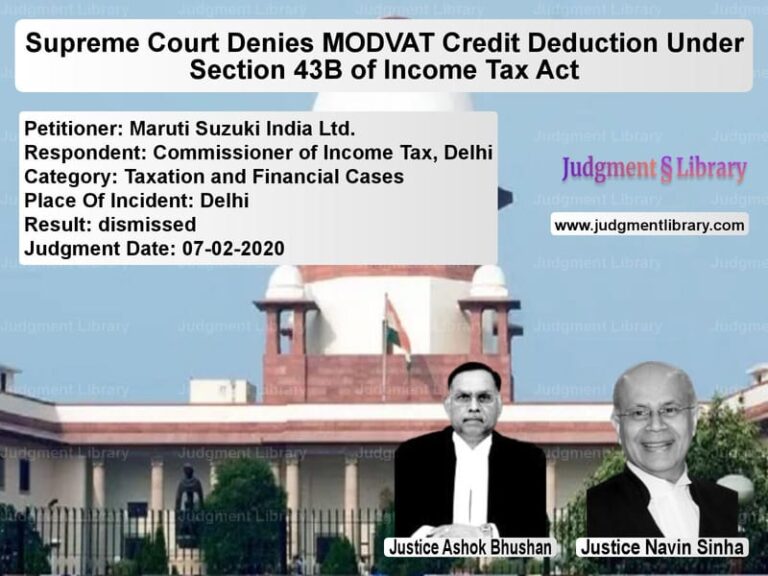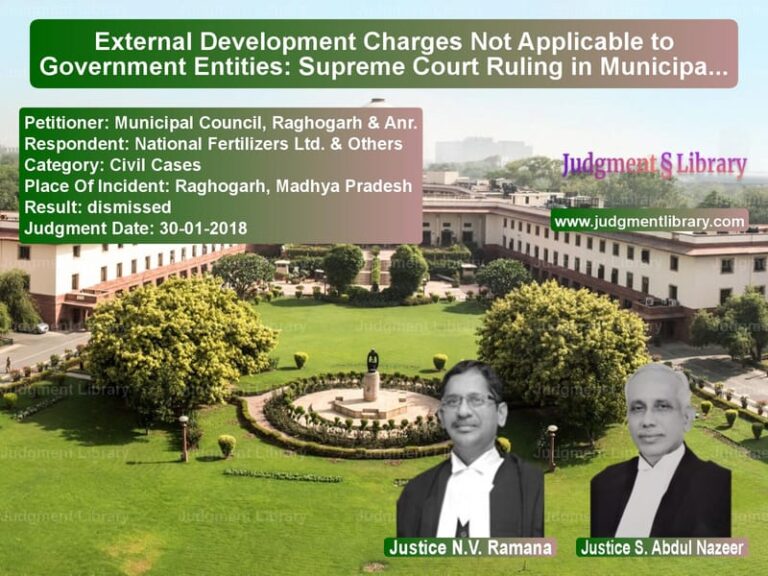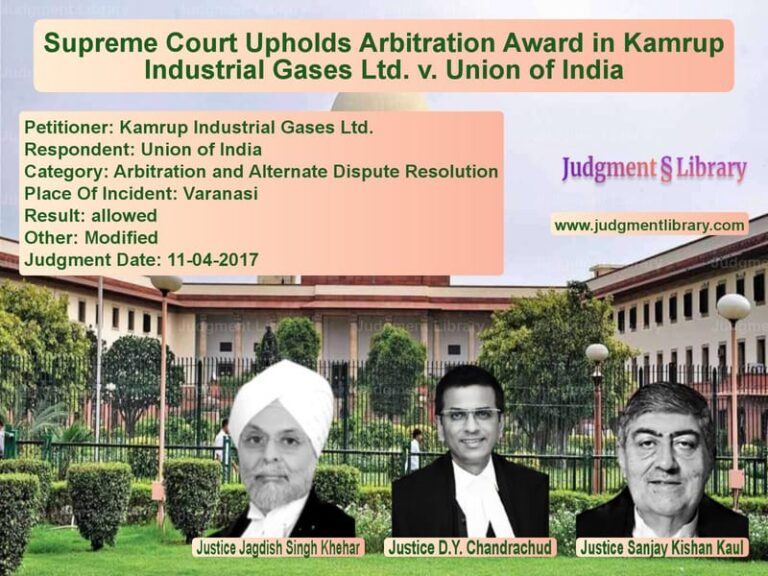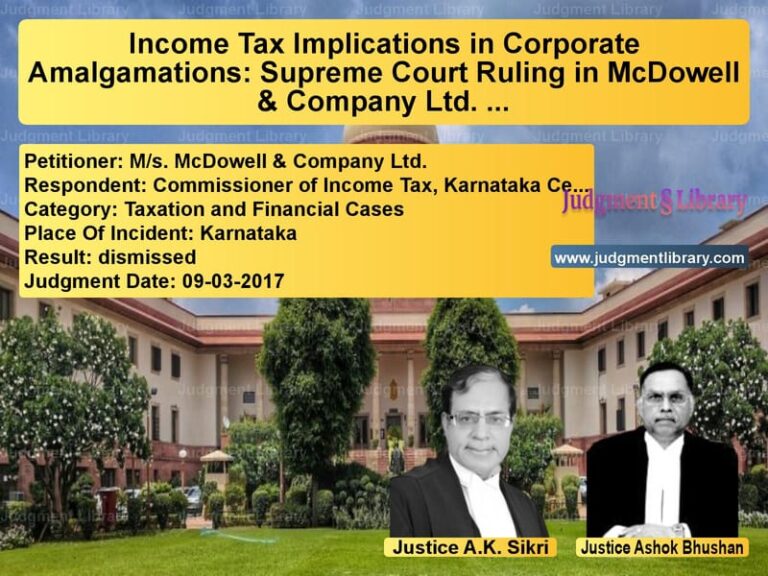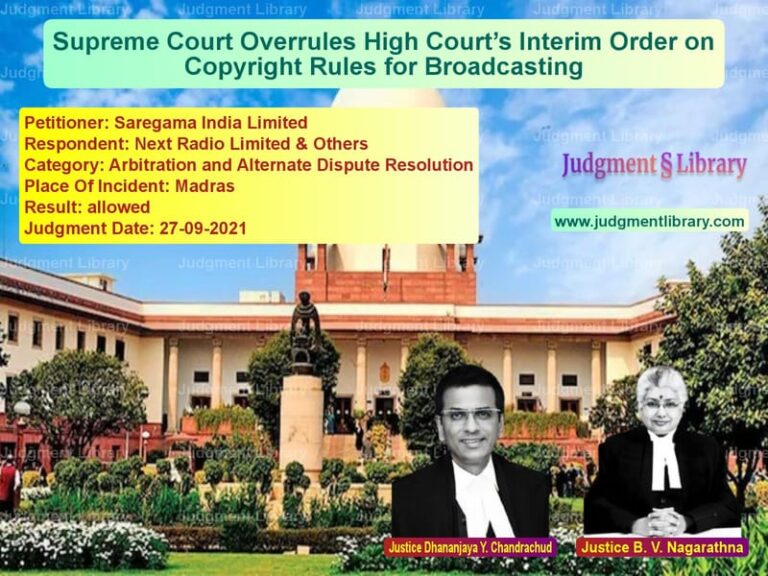Bihar Electricity Duty Dispute: Supreme Court Remands Case for Fresh Consideration
The Supreme Court of India recently adjudicated on a significant dispute regarding electricity duty in the case of M/s Magadh Sugar & Energy Ltd. vs. The State of Bihar & Ors.. The dispute centered around the imposition of electricity duty and penalties on the supply of power to the Bihar State Electricity Board (BSEB). The Supreme Court set aside the Patna High Court’s decision that dismissed the writ petition, ruling that the case merited fresh consideration.
Background of the Case
The appellant, M/s Magadh Sugar & Energy Ltd., operates a sugar mill in Narkatiaganj, Bihar. The sugar mill generates electricity using bagasse, a byproduct of sugar production. While a portion of the generated power is used for self-consumption, the surplus electricity is supplied to BSEB.
The Bihar Electricity Duty Act, 1948, authorizes the state government to impose duty on electricity consumption and sale. In 2002, the Bihar government amended Section 3(1) of the Act to allow taxation on the basis of either units consumed or the value of energy sold.
The Bihar government subsequently issued notifications:
- October 21, 2002: Imposed a duty of 6% on the value of energy consumed or sold.
- March 4, 2005: Extended the duty to captive power plants.
- January 14, 2011: Exempted electricity generated for self-consumption.
The appellant, through the Bihar Sugar Mills Association, challenged these notifications in the Patna High Court, arguing that they lacked statutory guidelines. In 2009, the High Court struck down the amendments and the notifications. However, while the appeal was pending before the Supreme Court, the Bihar government retrospectively amended the Act in 2012 to define the term “value of energy.” This led to fresh litigation.
Electricity Duty Demand and High Court Ruling
In 2015, the Assistant Commissioner of Commercial Tax issued a notice to the appellant, demanding approximately ₹67 crores in electricity duty and penalties for the years 2010-11 to 2012-13. The appellant challenged the demand in the High Court, arguing that:
- Electricity duty could not be levied on the sale of electricity to a licensee (BSEB) under Section 3(1) of the Act.
- BSEB, as a licensee, was responsible for paying duty when selling electricity to consumers.
- The levy of duty on both the generator and the distributor constituted double taxation.
- The 2011 notification granted an exemption for self-generated electricity.
The High Court dismissed the petition, ruling that the appellant had an alternative statutory remedy under the Bihar Electricity Duty Act. The appellant then appealed to the Supreme Court.
Arguments by the Petitioner (Magadh Sugar & Energy Ltd.)
- The appellant argued that under Section 3(1) of the Act, duty is imposed on the “value of energy” only when sold to a consumer.
- As per Section 2(b) of the Act, a “consumer” excludes a “licensee,” and BSEB falls under the definition of “licensee” under Section 2(d).
- The sale of electricity by the generator to BSEB does not fall within the purview of the Act’s charging provisions.
- The levy of duty on a generator selling to a licensee would result in double taxation because BSEB already pays duty when selling to consumers.
- The 2011 notification explicitly exempted captive power plants, including the appellant.
Arguments by the Respondents (State of Bihar & BSEB)
- The respondents contended that Section 3 of the Act imposes duty on “units of energy” consumed or sold, covering all transactions, including sales to a licensee.
- The definition of “value of energy” in Section 2(ee) includes charges payable by consumers and any charges linked to energy transactions.
- Electricity duty is designed to be levied at multiple stages of sale to ensure state revenue.
- The retrospective amendment in 2012 clarified the taxation structure and validated past collections.
- The High Court was correct in directing the appellant to pursue alternative statutory remedies.
Supreme Court’s Key Observations
- The Court held that the interpretation of “consumer” and “licensee” under the Act was a substantial legal question that required adjudication.
- Since the High Court had ruled in favor of NTPC in a similar case, inconsistent findings on the same legal issue needed review.
- Alternative statutory remedies do not bar the High Court from exercising jurisdiction in cases involving constitutional challenges.
- The Court emphasized that tax laws must be interpreted in a manner that does not result in double taxation or undue financial burden.
Final Verdict
Based on its findings, the Supreme Court:
- Allowed the appeal, setting aside the High Court’s dismissal.
- Remanded the case to the Patna High Court for fresh adjudication.
- Directed the High Court to consider the legality of the Bihar government’s retrospective amendments and the validity of electricity duty on generator-to-licensee sales.
- Clarified that the High Court must assess whether double taxation principles had been violated.
Implications of the Judgment
This ruling holds significant implications for electricity duty regulation and taxation law:
- Judicial Review of Tax Laws: Courts must ensure that tax laws do not impose unfair burdens on businesses.
- Clarification of Electricity Duty: The decision will help define taxation rules for power generation companies.
- Precedent for Similar Cases: The ruling affects how states can levy duty on intra-sector energy transactions.
- Ensuring Fair Competition: The judgment emphasizes that tax policies must not unfairly disadvantage power generators.
Conclusion
The Supreme Court’s decision in M/s Magadh Sugar & Energy Ltd. vs. The State of Bihar & Ors. reinforces the judiciary’s role in tax law interpretation. By remanding the case, the Court has ensured that critical legal questions surrounding electricity duty, consumer definition, and double taxation are examined in depth. The verdict provides a much-needed opportunity for clarity on taxation policies impacting the power generation sector.
Read also: https://judgmentlibrary.com/supreme-court-orders-fresh-tribunal-review-in-anti-dumping-duty-case/
Petitioner Name: M/s Magadh Sugar & Energy Ltd..Respondent Name: The State of Bihar & Ors..Judgment By: Justice Dhananjaya Y Chandrachud, Justice Vikram Nath, Justice B.V. Nagarathna.Place Of Incident: Bihar.Judgment Date: 24-09-2021.
Don’t miss out on the full details! Download the complete judgment in PDF format below and gain valuable insights instantly!
Download Judgment: ms-magadh-sugar-&-e-vs-the-state-of-bihar-&-supreme-court-of-india-judgment-dated-24-09-2021.pdf
Directly Download Judgment: Directly download this Judgment
See all petitions in Income Tax Disputes
See all petitions in Tax Evasion Cases
See all petitions in Judgment by Dhananjaya Y Chandrachud
See all petitions in Judgment by Vikram Nath
See all petitions in Judgment by B.V. Nagarathna
See all petitions in allowed
See all petitions in Remanded
See all petitions in supreme court of India judgments September 2021
See all petitions in 2021 judgments
See all posts in Taxation and Financial Cases Category
See all allowed petitions in Taxation and Financial Cases Category
See all Dismissed petitions in Taxation and Financial Cases Category
See all partially allowed petitions in Taxation and Financial Cases Category

